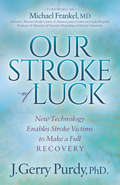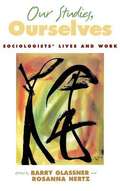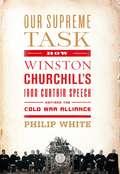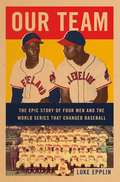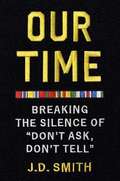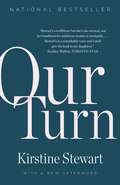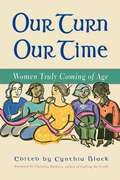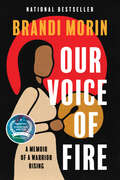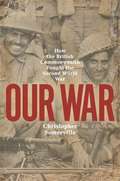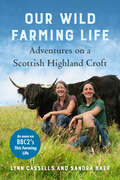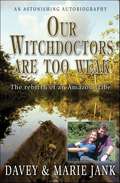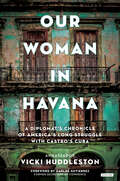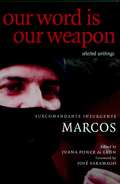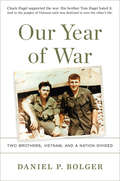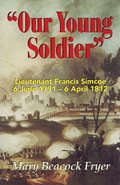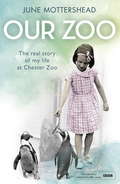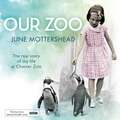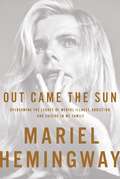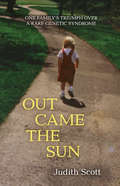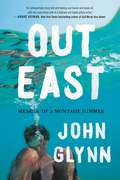- Table View
- List View
Our Stroke of Luck: New Technology Enables Stroke Victims to Make a Full Recovery
by J. Gerry PurdyMost people think that stroke victims end up looking like Frankenstein with a horrible facial expression and erratic movements. But, that is not the way it has to be. Today, it is possible for some stroke victims to make a full recovery. Gerry Purdy knows this because his wife, Alicia – a healthy, beautiful and smart person – suffered a stroke on August 23, 2011 and was able to return to her vivacious self.Our Stroke of Luck portrays the life they had together. Gerry and Alicia had dated in high school and got back together for their 45th high school reunion. Life was good. And then – Bam! – without warning Alicia suffered a stroke. Find out how Alicia’s neurosurgeon was able to remove the clot from her brain that caused the stroke. Experience the tense ups and downs of that night—one moment seeming as though she might be paralyzed on her left side for the rest of her life and then the next seeing a flash of hope. Gerry and Alicia were lucky that the radiologist was able to identify the clot in her brain and lucky to get her transferred to the Marcus Stroke Center at Grady Hospital in Atlanta. They were lucky that Dr. Nogueira was able to extract the clot from Alicia’s brain. And, finally, they were lucky that she was able to make a full recovery. Truly, this was their stroke of luck.
Our Studies, Ourselves: Sociologists' Lives and Work
by Rosanna Hertz Barry GlassnerWhat motivates a lifelong scholarly pursuit, and how do one's studies inform life outside the academy? Sociologists, who live in families but also study families, who go to work but also study work, who participate in communities but also try to understand communities, have an especially intimate relation to their research. Growing up poor, struggling as a woman in a male-dominated profession, participating in protests against the Vietnam War; facts of life influence research agendas, individual understandings of the world, and ultimately the shape of the discipline as a whole. Barry Glassner and Rosanna Hertz asked twenty-two of America's most prominent sociologists to reflect upon how their personal lives influenced their research, and vice versa, how their research has influenced their lives. In this volume, the authors reveal with candor and discernment how world events, political commitments and unanticipated constraints influenced the course of their careers. They disclose how race, class, and gender proved to be pivotal elements in the course of their individual lives, and in how they carry out their research.; Faced with academic institutions that did not hire or promote persons of their gender, race, sexual orientation, or physical disability, they invented new routes to success within their fields. Faced with disappointments in political organizations to which they were devoted, they found ways to integrate their disillusionment into their research agendas. While some of the contributors radically changed their political commitments, and others saw more stability, none stood still. An intimate look at biography and craft, these snapshots provide a fascinating glimpse of the sociological life for colleagues, other academics, and aspiring young sociologists. The collection demonstrates how inequalities and injustices can be made into motors for scholarly research, which in turn have the power to change individual life courses and entire societies
Our Supreme Task: How Winston Churchill's Iron Curtain Speech Defined the Cold War Alliance
by Philip WhiteThe dramatic history of Winston ChurchillOCOs 1946 trip to Fulton, Missouri, where he delivered his speech warning of the dangers of communism and cemented his legacy
Our Team: The Epic Story of Four Men and the World Series that Changed Baseball
by Luke EpplinIn July 1947, not even three months after Jackie Robinson debuted on the Brooklyn Dodgers, snapping the color line that had segregated Major League Baseball, Larry Doby would follow in his footsteps on the Cleveland Indians. Though Doby, as the second Black player in the majors, would struggle during his first summer in Cleveland, his subsequent turnaround in 1948 from benchwarmer to superstar sparked one of the wildest and most meaningful seasons in baseball history. <p><p> In intimate, absorbing detail, Luke Epplin's Our Team traces the story of the integration of the Cleveland Indians and their quest for a World Series title through four key participants: Bill Veeck, an eccentric and visionary owner adept at exploding fireworks on and off the field; Larry Doby, a soft-spoken, hard-hitting pioneer whose major-league breakthrough shattered stereotypes that so much of white America held about Black ballplayers; Bob Feller, a pitching prodigy from the Iowa cornfields who set the template for the athlete as businessman; and Satchel Paige, a legendary pitcher from the Negro Leagues whose belated entry into the majors whipped baseball fans across the country into a frenzy. Together, as the backbone of a team that epitomized the postwar American spirit in all its hopes and contradictions, these four men would captivate the nation by storming to the World Series--all the while rewriting the rules of what was possible in sports.
Our Time: Breaking the Silence of "Don't Ask, Don't Tell"
by Josh SeefriedOur Time marks the end of more than a decade of silence, giving voice to the LGBT men and women who served under “Don’t Ask, Don’t Tell. ” These individuals enlisted knowing that the military would ask them to bury an integral part of themselves and yet joined because of their deep belief that the values of the military were worth the tremendous sacrifice. Our Time shares their stories for the first time, revealing an intimate portrait of military life. Edited by air force officer Josh Seefried, a cofounder of the LGBT active duty military association OutServe, Our Time is a collection of remarkable depth and diversity. We witness the abuse—physical and mental—endured at the hands of fellow soldiers and superiors. We see the hardships faced by their families and partners and feel the pain of the choice between military and self. There are also examples of humanity at its very best: leaders with the courage to support their comrades in the face of tremendous pressure, friendships forged and minds opened, and love that endures the very toughest of odds. Throughout we are reminded of the bravery and selflessness of the men and women who chose to serve our country and defend our liberties while their own freedom was withheld. At once a testament to the wrongs of the policy and a celebration of the good that endured in spite of it, Our Time marks the start of a new era in our national history .
Our Turn
by Kirstine StewartIn her inspiring, deeply intelligent and intensely practical Our Turn, Kirstine Stewart draws on her own extensive leadership experience to take the conversation about women and work to a whole new level. Simply put: the time is now for new styles of leadership, and women are best-suited to set the pace. Kirstine Stewart got her first job when she applied for a position as a "girl Friday" at a film distribution house. Having worked her way up from the bottom--under women and men, leaders good and bad--she believes it's time we leaped past the question of how women might create change in the working world and exploit the fact that profound change is already under way. The digital revolution, and the wave of millennials who are entering the work force with very different expectations than the generations who preceded them, have created a new reality that demands a new style of leader with attributes and perspectives that make women the natural front-runners. The opportunity is there. The question Stewart tackles in Our Turn is how do we seize it. Stewart's own track in the world has been exceptional, and littered with firsts, including being the first woman and the youngest person ever to head the CBC. Not only does she illuminate the broad strokes of the way forward for women, and her own principles of leadership, she digs down into the nitty-gritty of how she has managed to excel and to lead while staying true to who she is as a person. Whether you're the CEO or the administrative assistant, there is something for you in Our Turn.
Our Turn Our Time: Women Truly Coming of Age
by Christina BaldwinOur Turn, Our Time is an amazing collection of essays written by women who are committed to celebrating and valuing the passage into the second half of life. These women are redefining the role older women play in contemporary society by embracing creativity, spirituality, and sisterhood. These essays are filled with insight, humor, and compassion on a broad variety of topics: the richness of women's groups, the rewards of volunteering, the power of crone ceremonies, the fires of creative expression, the challenges of a changing body, and the confidence that comes from success in later life. Individually, the essays are inspirational and motivating. As a collection, the book becomes a unique support system for women as they age together, providing the opportunity to embrace each passing year with grace and enthusiasm. You will not find celebrities in this book. Our Turn, Our Time is written by everyday women for everyday women, creating equality and unity. The women in this book are positive role models and they will encourage other women to have an enriching, uplifting, and a refreshingly new perspective on the second half of life!
Our Voice of Fire: A Memoir of a Warrior Rising
by Brandi MorinA wildfire of a debut memoir by internationally recognized French/Cree/Iroquois journalist Brandi Morin set to transform the narrative around Indigenous Peoples. Brandi Morin is known for her clear-eyed and empathetic reporting on Indigenous oppression in North America. She is also a survivor of the Missing and Murdered Indigenous Women and Girls crisis and uses her experience to tell the stories of those who did not survive the rampant violence. From her time as a foster kid and runaway who fell victim to predatory men and an oppressive system to her career as an internationally acclaimed journalist, Our Voice of Fire chronicles Morin’s journey to overcome enormous adversity and find her purpose, and her power, through journalism. This compelling, honest book is full of self-compassion and the purifying fire of a pursuit for justice.
Our War: Real stories of Commonwealth soldiers during World War II
by Christopher SomervilleNever heard before real stories of soldiers who fought in WW2 'Extraordinary ...If they had not made our war their war also, victory might not have come in 1945' DAILY TELEGRAPHIn this powerful and moving narrative, Christopher Somerville skilfully links personal testimonies to present an epic which embraces comedy and tragedy, pride and degradation, close comradeship and stark racial prejudice, devotion to the benign Mother Country and a burning desire to see the back of her. Many of the veterans had never previously talked of their experiences, even to close loved ones. They cover such topics as attitudes to Britain before and after the war, why Commonwealth citizens offered to fight, and how some volunteers were inspired by their wartime service while others were thoroughly disillusioned. The result is a rare and faithful memoir to the five million Commonwealth citizens who fought for the Allies and the 170,000 who died or went missing.
Our War: Real stories of Commonwealth soldiers during World War II
by Christopher SomervilleNever heard before real stories of soldiers who fought in WW2'Extraordinary ...If they had not made our war their war also, victory might not have come in 1945' DAILY TELEGRAPHIn this powerful and moving narrative, Christopher Somerville skilfully links personal testimonies to present an epic which embraces comedy and tragedy, pride and degradation, close comradeship and stark racial prejudice, devotion to the benign Mother Country and a burning desire to see the back of her. Many of the veterans had never previously talked of their experiences, even to close loved ones. They cover such topics as attitudes to Britain before and after the war, why Commonwealth citizens offered to fight, and how some volunteers were inspired by their wartime service while others were thoroughly disillusioned. The result is a rare and faithful memoir to the five million Commonwealth citizens who fought for the Allies and the 170,000 who died or went missing.
Our Wild Farming Life: Adventures on a Scottish Highland Croft
by Lynn Cassells Sandra BaerAs seen on the BBC’s This Farming Life The inspirational story of Lynbreck Croft—a regenerative Scottish farm rooted in local food, community, and the dreams of two women. "A ripping good account of the guts, luck and perseverance it takes to create a productive and healthy farm or croft that jumps the rails of our conventional industrial agriculture."—Nick Offerman, New York Times bestselling author of Where the Deer and the Antelope Play "I raced through this beautiful story with mounting awe and excitement. . . . Pragmatism, honesty and openness to new and old ideas shines through on every page. I hope it inspires legions of new farmers."—Isabella Tree, author of Wilding Lynn and Sandra left their friends, family, and jobs in England to travel north to Scotland to find a bit of land that they could call their own. They had in mind keeping a few chickens, a kitchen garden, and renting out some camping space; instead, they fell in love with Lynbreck Croft—150 acres of opportunity and beauty, shrouded by the Cairngorms and deep in the Highlands of Scotland. But they had no money, no plan, and no experience in farming. In Our Wild Farming Life, Lynn and Sandra recount their experiences as they rebuild their new home and work out what kind of farmers they want to be. They learn how to work with Highland cattle, become part of the crofting community and begin to truly understand how they can farm in harmony with nature to produce wonderful food for themselves and the people around them. Through efforts like these, Lynn and Sandra have been able to combine regenerative farming practices with old crofting traditions to keep their own personal values intact. Our Wild Farming Life is what happens when you follow your dreams of living on the land; a story of how two people became farmers—and how they learned to make a living from it, their way. "[This] is a warm yet realistic chronicle of the world of the small-time farmer, sharing a vision of how we humans can feed ourselves sustainably and ethically while living in harmony with the natural world."—Booklist "For anyone who has ever sat in a city office dreaming of . . . living off the land, this book will inspire them to take the plunge."—The Telegraph
Our Wild Farming Life: Adventures on a Scottish Highland Croft
by Lynn Cassells Sandra BaerAs seen on the BBC&’s This Farming LifeThe inspirational story of Lynbreck Croft—a regenerative Scottish farm rooted in local food, community, and the dreams of two women."A ripping good account of the guts, luck and perseverance it takes to create a productive and healthy farm or croft that jumps the rails of our conventional industrial agriculture."—Nick Offerman, New York Times bestselling author of Where the Deer and the Antelope Play"I raced through this beautiful story with mounting awe and excitement. . . . Pragmatism, honesty and openness to new and old ideas shines through on every page. I hope it inspires legions of new farmers."—Isabella Tree, author of WildingLynn and Sandra left their friends, family, and jobs in England to travel north to Scotland to find a bit of land that they could call their own. They had in mind keeping a few chickens, a kitchen garden, and renting out some camping space; instead, they fell in love with Lynbreck Croft—150 acres of opportunity and beauty, shrouded by the Cairngorms and deep in the Highlands of Scotland.But they had no money, no plan, and no experience in farming.In Our Wild Farming Life, Lynn and Sandra recount their experiences as they rebuild their new home and work out what kind of farmers they want to be. They learn how to work with Highland cattle, become part of the crofting community and begin to truly understand how they can farm in harmony with nature to produce wonderful food for themselves and the people around them. Through efforts like these, Lynn and Sandra have been able to combine regenerative farming practices with old crofting traditions to keep their own personal values intact.Our Wild Farming Life is what happens when you follow your dreams of living on the land; a story of how two people became farmers—and how they learned to make a living from it, their way."[This] is a warm yet realistic chronicle of the world of the small-time farmer, sharing a vision of how we humans can feed ourselves sustainably and ethically while living in harmony with the natural world."—Booklist"For anyone who has ever sat in a city office dreaming of . . . living off the land, this book will inspire them to take the plunge."—The Telegraph
Our Witchdoctors Are Too Weak: The Rebirth of an Amazon Tribe
by Marie Jank Davey JankWhen US missionary Davey Jank starts a new life in the Amazon jungle among a remote tribe, he enters a world where witchcraft and shamanism are the trade of the powerful, and where fear drives a timid and isolated society to acts of desperation and the brink of despair. Davey, Marie and the others who later join them struggle to decipher and learn the unwritten language of the tribe. Within a few years the Wilos are enthusiastically reading and writing in their own language for the first time. But they want more. They want to know what "God's Talk" says. They hope that there is something more to life than the vicious cycle of fearing and appeasing the evil spirits at every turn. Finally the Wilos get what they have so long been waiting for: God's Word, taught in their own language. God had been preparing their hearts for this very message.
Our Woman in Havana: A Diplomat's Chronicle of America's Long Struggle with Castro's Cuba
by Vicki HuddlestonA top US diplomat&’s compelling memoir of her years in Cuba and the tumultuous relationship between the two countries: &“Unparalleled insight.&” —Culture Trip After the US embassy in Havana was closed in 1961, relations between the countries broke off. A thaw came in 1977 with the opening of a de facto embassy in Havana, the US Interests Section—where Vicki Huddleston would later serve under Presidents Clinton and George W. Bush. In her memoir of a diplomat at work, she tells gripping stories of face-to-face encounters with Fidel Castro and the initiatives she undertook, like the transistor radios she furnished to ordinary Cubans. Along with inside accounts of dramatic episodes such as the Elián González custody battle, Huddleston also evokes the charm of the island country and her warm affection for the Cuban people. Uniquely qualified to explain the inner workings of US-Cuba relations, Huddleston examines the Obama administration&’s diplomatic opening of 2014, the mysterious &“sonic&” brain and hearing injuries suffered by US and Canadian diplomats serving in Havana, and the rescinding of the diplomatic opening under the Trump administration. She recounts missed opportunities for détente, and the myths, misconceptions, and lies that have long pervaded US-Cuba relations. Our Woman in Havana is essential reading for everyone interested in Cuba, including the thousands of Americans visiting the island every year, as well as policymakers and observers who study the stormy relationship with our near neighbor. &“Anyone interested in the nitty-gritty of policy-making in Washington, and any young foreign service officer intrigued by worldly adventures will thoroughly enjoy.&” —Ambassador Joseph Wilson, author of The Politics of Truth: Inside the Lies that Led to War and Betrayed My Wife&’s CIA Identity
Our Woman in Kabul
by Irris MaklerOne of the first journalists into Afghanistan after the September 11 attacks, Irris Makler set out to cover a war and discovered a story about women caught in the crossfire.
Our Word is Our Weapon: Selected Writings
by Jose Saramago Juana Ponce De Leon Subcomandante Marcos Ana CarriganIn this landmark book, Seven Stories Press presents a powerful collection of literary, philosophical, and political writings of the masked Zapatista spokesperson, Subcomandante Insurgente Marcos. Introduced by Nobel Prize winner José Saramago, and illustrated with beautiful black and white photographs, Our Word Is Our Weapon crystallizes "the passion of a rebel, the poetry of a movement, and the literary genius of indigenous Mexico." Marcos first captured world attention on January 1, 1994, when he and an indigenous guerrilla group calling themselves "Zapatistas" revolted against the Mexican government and seized key towns in Mexico's southernmost state of Chiapas. In the six years that have passed since their uprising, Marcos has altered the course of Mexican politics and emerged an international symbol of grassroots movement-building, rebellion, and democracy. The prolific stream of poetic political writings, tales, and traditional myths that Marcos has penned since January 1, 1994 fill more than four volumes. Our Word Is Our Weapon presents the best of these writings, many of which have never been published before in English.Throughout this remarkable book we hear the uncompromising voice of indigenous communities living in resistance, expressing through manifestos and myths the universal human urge for dignity, democracy, and liberation. It is the voice of a people refusing to be forgotten the voice of Mexico in transition, the voice of a people struggling for democracy by using their word as their only weapon.
Our World: Our OFFICIAL autobiography
by Little MixCelebrate Little Mix's first UK number-one album - Glory Days - by reading the full story of the girls' astonishing rise to pop super stardom. Our World is full of exclusive photos and inspirational stories about Jade, Perrie, Jesy and Leigh-Anne's unique friendship.Little Mix are the UK's most successful girl band. They first found fame - and each other - on The X Factor in 2011. Five years later they have gone from strength to strength, achieving huge global success. With three platinum-selling albums in the UK and over 14 million record sales worldwide, the band are both adored by their fans and critically acclaimed for their brilliant music. In this book the girls share the real behind-the-scenes story of both their personal lives and their success. They reveal the many highs - what it feels like to perform in front of thousands of people; the excitement of seeing your music soar to Number One around the world - but also the lows. Through it all the girls have had each other, and their incredibly close friendship has grown stronger and stronger as the years have gone by. Now the girls are like sisters, and in this book they share their journeys and how it feels for your dreams to come true.Brimming with exclusive photos, this book shares with us the girls' innermost secrets - their hopes and dreams for the future, their families, their relationships, their style advice and above all their friendship. This book is Little Mix's story in their own words and tells you everything you need to know about their lives both in and out of the spotlight.
Our Year of War: Two Brothers, Vietnam, and a Nation Divided
by Daniel P. BolgerTwo brothers--Chuck and Tom Hagel--who went to war in Vietnam, fought in the same unit, and saved each other's life. They disagreed about the war, but they fought it together.1968. America was divided. Flag-draped caskets came home by the thousands. Riots ravaged our cities. Assassins shot our political leaders. Black fought white, young fought old, fathers fought sons. And it was the year that two brothers from Nebraska went to war.In Vietnam, Chuck and Tom Hagel served side by side in the same rifle platoon. Together they fought in the Mekong Delta, battled snipers in Saigon, chased the enemy through the jungle, and each saved the other's life under fire. But when their one-year tour was over, these two brothers came home side-by-side but no longer in step--one supporting the war, the other hating it.Former Secretary of Defense Chuck Hagel and his brother Tom epitomized the best, and withstood the worst, of the most tumultuous, shocking, and consequential year in the last half-century. Following the brothers' paths from the prairie heartland through a war on the far side of the world and back to a divided America, Our Year of War tells the story of two brothers at war--a gritty, poignant, and resonant story of a family and a nation divided yet still united.
Our Young Soldier: Lieutenant Francis Simcoe 6 June 1791-6 April 1812
by Mary Beacock FryerFrancis Simcoe was the eldest son of John Graves Simcoe and Elizabeth Gwillim. his father is celebrated as the first lieutenant governor of Upper Canada; his mother for her Canadian diary and watercolour sketches. Francis was one year old when his family arrived at Newark (Niagara-on-the-Lake) in 1792, and almost six when they returned to England.Letters written by his mother, sisters, and himself reveal his childhood at Eton. At sixteen, he was an ensign in the 27th Inniskilling Regiment. From the beginning of his military career, he kept journals and wrote many letters preserved by the family. His service began in ireland and ended under Wellington - he died leading a storming party in the Trinidad breach at Badajoz, Spain, a thoroughly bloody, costly battle in the Peninsular war.The army had lost a talented young officer. As a warrior, Francis possessed the qualities that had carried his father from ensign to lieutenant general. Letters and journals disclose a soldier who was also an intelligent, loving human being. Of special interest are Francis’ associates who spent time in Canada - the Duek of Richmond, Edward Littlehales, James Kempt, and Julia Somerville (more than a friend?) who became Mrs. Francis Bond Head four years after young Simcoe’s death.
Our Zoo
by June Mottershead'With characteristic self-effacement, she puts the escapades of charismatic animals ahead of her own feelings.' The Guardian.When George Mottershead moved to the village of Upton-by-Chester in 1930 to realise his dream of opening a zoo without bars, his four-year-old daughter June had no idea how extraordinary her life would become. Soon her best friend was a chimpanzee called Mary, lion cubs and parrots were vying for her attention in the kitchen, and finding a bear tucked up in bed was no more unusual than talking to a tapir about granny's lemon curd. Pelican, penguin or polar bear - for June, they were simply family. The early years were not without their obstacles for the Mottersheads. They were shunned by the local community, bankruptcy threatened and then World War Two began. Nightly bombing raids turned the dream into a nightmare and finding food for the animals became a constant challenge. Yet George's resilience, resourcefulness and tenacity eventually paid off. Now over 80 years since June first set foot in the echoing house, Chester Zoo has achieved worldwide renown. Here, in her enthralling memoir, June Mottershead chronicles the heartbreak, the humour, the trials and triumphs, above all the characters, both human and animal, who shaped her childhood.
Our Zoo
by June Mottershead'With characteristic self-effacement, she puts the escapades of charismatic animals ahead of her own feelings.' The Guardian.When George Mottershead moved to the village of Upton-by-Chester in 1930 to realise his dream of opening a zoo without bars, his four-year-old daughter June had no idea how extraordinary her life would become. Soon her best friend was a chimpanzee called Mary, lion cubs and parrots were vying for her attention in the kitchen, and finding a bear tucked up in bed was no more unusual than talking to a tapir about granny's lemon curd. Pelican, penguin or polar bear - for June, they were simply family. The early years were not without their obstacles for the Mottersheads. They were shunned by the local community, bankruptcy threatened and then World War Two began. Nightly bombing raids turned the dream into a nightmare and finding food for the animals became a constant challenge. Yet George's resilience, resourcefulness and tenacity eventually paid off. Now over 80 years since June first set foot in the echoing house, Chester Zoo has achieved worldwide renown. Here, in her enthralling memoir, June Mottershead chronicles the heartbreak, the humour, the trials and triumphs, above all the characters, both human and animal, who shaped her childhood.
Our Zoo
by June MottersheadWhen George Mottershead moved to the village of Upton-by-Chester in 1930 to realise his dream of opening a zoo without bars, his four-year-old daughter June had no idea how extraordinary her life would become. Soon her best friend was a chimpanzee called Mary, lion cubs and parrots were vying for her attention in the kitchen, and finding a bear tucked up in bed was no more unusual than talking to a tapir about granny's lemon curd. Pelican, penguin or polar bear - for June, they were simply family. The early years were not without their obstacles for the Mottersheads. They were shunned by the local community, bankruptcy threatened and then World War Two began. Nightly bombing raids turned the dream into a nightmare and finding food for the animals became a constant challenge. Yet George's resilience, resourcefulness and tenacity eventually paid off. Now over 80 years since June first set foot in the echoing house, Chester Zoo has achieved worldwide renown. Here, in her enthralling memoir, June Mottershead chronicles the heartbreak, the humour, the trials and triumphs, above all the characters, both human and animal, who shaped her childhood.(P)2014 Headline Digital
Out Came the Sun
by Mariel Hemingway Ben GreenmanA moving, compelling memoir about growing up and escaping the tragic legacy of mental illness, suicide, addiction, and depression in one of America's most famous families: the Hemingways.She opens her eyes. The room is dark. She hears yelling, smashed plates, and wishes it was all a terrible dream. But it isn't. This is what it was like growing up as a Hemingway. In this deeply moving, searingly honest new memoir, actress and mental health icon Mariel Hemingway shares in candid detail the story of her troubled childhood in a famous family haunted by depression, alcoholism, illness, and suicide. Born just a few months after her grandfather, Ernest Hemingway, shot himself, it was Mariel's mission as a girl to escape the desperate cycles of severe mental health issues that had plagued generations of her family. Surrounded by a family tortured by alcoholism (both parents), depression (her sister Margaux), suicide (her grandfather and four other members of her family), schizophrenia (her sister Muffet), and cancer (mother), it was all the young Mariel could do to keep her head. In a compassionate voice she reveals her painful struggle to stay sane as the youngest child in her family, and how she coped with the chaos by becoming OCD and obsessive about her food, schedule, and organization. The twisted legacy of her family has never quite let go of Mariel, but now in this memoir she opens up about her claustrophobic marriage, her acting career, and turning to spiritual healers and charlatans for solace. Ultimately Mariel has written a story of triumph about learning to overcome her family's demons and developing love and deep compassion for them. At last, in this memoir she can finally tell the true story of the tragedies and troubles of the Hemingway family, and she delivers a book that beckons comparisons with Mary Karr and Jeanette Walls.
Out Came the Sun: One Family's Triumph over a Rare Genetic Syndrome
by Judith ScottSix years into their marriage, Judith and Greg Scott decided to have a child; they were blessed with the birth of beautiful Emily. But their euphoria was short lived when their child was diagnosed with a rare and disabling condition: Partial Trisomy 13. Emily, they were told, would never walk, talk or read. From this tragic beginning unfolds the astonishing, life-altering journey of Out Came the Sun. Emily struggles to learn life's simple tasks, lagging far behind her peers. And the strains on her parents' marriage nearly cause it to come apart at the seams. But when Emily starts exceeding her doctor's expectations, Judith realizes that she too can overcome adversity by opening her life to more love and more children. This riveting, beautiful memoir demonstrates that extraordinary fortitude requires to take misfortune and valiantly turn it into triumph.
Out East: Memoir of a Montauk Summer
by John GlynnAn "extraordinary" debut memoir of first love, identity, and self-discovery among a group of friends who became family in a Montauk summer house (Andrew Solomon, National Book Award winner).They call Montauk the end of the world, a spit of land jutting into the Atlantic. The house was a ramshackle split-level set on a hill, and each summer thirty-one people would sleep between its thin walls and shag carpets. Against the moonlight the house's octagonal roof resembled a bee's nest. It was dubbed The Hive.In 2013, John Glynn joined the share house. Packing his duffel for that first Memorial Day Weekend, he prayed for clarity. At twenty-seven, he was crippled by an all-encompassing loneliness, a feeling he had carried in his heart for as long as he could remember. John didn't understand the loneliness. He just knew it was there. Like the moon gone dark.Out East is the portrait of a summer, of The Hive and the people who lived in it, and John's own reckoning with a half-formed sense of self. From Memorial Day to Labor Day, The Hive was a center of gravity, a port of call, a home. Friendships, conflicts, secrets and epiphanies blossomed within this tightly woven friend group and came to define how they would live out the rest of their twenties and beyond. Blending the sand-strewn milieu of George Howe Colt's The Big House with the radiant aching of Olivia Liang's The Lonely City, Out East is a keenly wrought story of love and transformation, longing and escape in our own contemporary moment."An unforgettable story told with feeling and humor and above all with the razor-sharp skill of a delicate and highly gifted writer." -- André Aciman, New York Times bestselling author of Call Me by Your Name"Out East is full of intimacy and hope and frustration and joy, an extraordinary tale of emotional awakening and lacerating ambivalence, a confession of self-doubt that becomes self-knowledge." -- Andrew Solomon, National Book Award winnerAn Entertainment Weekly Best Book of May 2019A Time magazine Best Book of May 2019Cosmopolitan Best Book of May 2019An O, the Oprah Magazine Best LGBTQ Book of 2019
